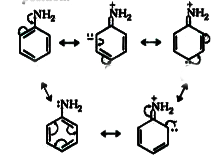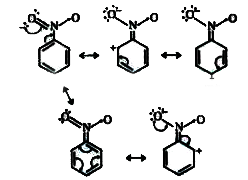What is the positive and negative resonance effect ? Explain with examples
The resonance effect is defined as the polarity produced in the molecule by the interaction of two π-bonds or between a π-bond and lone pair of electrons present on an adjacent atom. The effect is transmitted through the chain. These are two types as resonance or mesomeric effect designed of R or M effect.
(a) Positive resonance (+R) or mesomeric (+M) effect: (i) Definition: When the transfer of electron is away from an atom or substituent group attached to the conjugated system. This electron displacement makes certain positions in the molecule of high electron densities. So this is called positive resonance (+R) effect. (ii) e.g. In aniline −OH group containing (+R) and (+M) effect and the non-bonding electron pair of N is transfer in benzene ring and aniline becomes polar. Due to this effect the electron density is increases at some position.

Its structure (II, III) and (IV) are polar and lone pair electron of ..N at definite position and negative charge and more electron density. (iii) The other examples of +R or +M effect containing groups are as under. −X,−OH,−OR,−OCOR,−NH2,−NHR,−NR2−NHCOR
(b) Negative resonance effect (-R) or negative mesomeric effect (-M): (i) Definition: When the transfer of electron is towards the atom or substituent group attached to the conjugated system then these groups are called (-R) or (-M) effect.
(ii) e.g. : In nitrobenzene, −NO2 group containing (-R) means (-M) effect and the electron pair of π-bond with N of out side of ring. Therefore nitrobenzene molecule become polar and at certain position the electron density decrease in ring and become positive

Structure (II), (III), (IV) are polar. The electron pair of ring transfer at out side in O-N bond and (+) charge is at specific position and electron density is less
(iii) (-R) means (-M) effect containing groups are −COOH,−CHO,>C=O,−CN,−NO2
Topper's Solved these Questions
- ORGANIC CHEMISTRY SOME BASIC PRINCIPLES AND TECHNIQUESBOOK - KUMAR PRAKASHANCHAPTER - ORGANIC CHEMISTRY SOME BASIC PRINCIPLES AND TECHNIQUESEXERCISE - Section -A(Methods of Purification of Organic Compounds)
44 Videos
- ORGANIC CHEMISTRY SOME BASIC PRINCIPLES AND TECHNIQUESBOOK - KUMAR PRAKASHANCHAPTER - ORGANIC CHEMISTRY SOME BASIC PRINCIPLES AND TECHNIQUESEXERCISE - Section -A (Qualitative Analysis of organic compounds)
12 Videos
- ORGANIC CHEMISTRY SOME BASIC PRINCIPLES AND TECHNIQUESBOOK - KUMAR PRAKASHANCHAPTER - ORGANIC CHEMISTRY SOME BASIC PRINCIPLES AND TECHNIQUESEXERCISE - Section A (Fundamental Concepts in Organic Reaction Mechanism
10 Videos
- HYDROGENBOOK - KUMAR PRAKASHANCHAPTER - HYDROGENEXERCISE - Section-D NCERT Exemplar (Long Answer)
8 Videos
- QUESTION ASKED IN JEE -2018BOOK - KUMAR PRAKASHANCHAPTER - QUESTION ASKED IN JEE -2018EXERCISE - MCQ
10 Videos
Similar Questions
What is isotopic effect? Explain with examples.
View SolutionWhat is tyndall effect ? Explain with an example.
View SolutionWhat is Tyndall effect? Explain with an example.
View SolutionWhat are positive and negative accelerations ? Give examples.
View SolutionWhat is the difference between tautomerism and resonance ? Explain with an example.
View SolutionNon-ideal solutions exhibit either positive or negative deviations from Raoult's law. What are these deviations and why are they caused ? Explain with one example for each type.
View SolutionNon - ideal solutions exhibit either positive or negative deviations from Raoult's law. What are these deviations and why are they caused? Explain with one example for each type.
View SolutionNon - ideal solutions exhibit either positive or negative deviations from Raoult's law. What are these deviations and why are they caused? Explain with one example for each type.
View SolutionNon-ideal solutions exhibit either positive or negative deviation from Raoult's law. What are these deviations and why are they caused? Explain with one example for each type.
View SolutionExplain any two positive and two negative effects of globalisation.
View Solution
